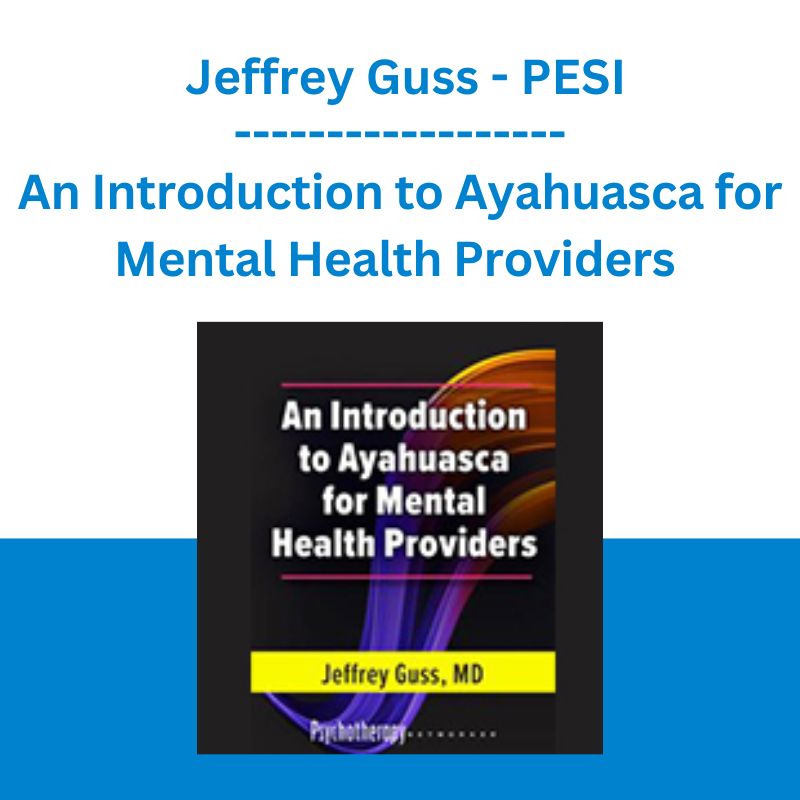*** Proof of Product ***
Exploring the Essential Features of “An Introduction to Ayahuasca for Mental Health Providers – Jeffrey Guss – PESI”
Ayahuasca is one of the most popular and least understood of the psychedelic agents. This recording will cover an introduction to ayahuasca, including biochemical, neuroscientific and historical/cultural aspects of its use. Following this, we’ll cover contemporary research on its effects on mental health and its use for treatment of conditions such as addiction and depression. Lastly, some of the psychodynamic aspects of shamanic and syncretic religions settings will be described.
Speaker
Jeffrey Guss, MD
Jeffrey Guss, MD, is a psychiatrist, psychoanalyst, researcher and teacher with specializations in psychoanalytic therapy and psychedelic therapy. He is on the faculty of the NYU Postdoctoral Program in Psychotherapy and Psychoanalysis and is a Clinical Assistant Professor of Psychiatry at NYU School of Medicine.
Dr. Guss was the Co-Principal Investigator and Director of Psychedelic Therapy Training for the NYU study on psilocybin-assisted psychotherapy in the treatment of cancer anxiety and is a study therapist with several MAPS studies. He has published on the integration of Acceptance and Commitment Therapy with psychedelic assisted therapy for MDD in Journal of Contextual and Behavioral Science and co-authored a paper on the influence of therapists’’ firsthand psychedelic experiences. He maintains a private practice in New York City.
Speaker Disclosures:
Financial: Dr. Jeffrey Guss is a lead trainer with Fluence. He has employment relationships with California Institute for Integral Studies, Yale University, and Cybin. Dr. Guss maintains a private practice. He receives a speaking honorarium from PESI, Inc.
Non-financial: Dr. Jeffrey Guss is a study therapist with the New York University Medical Center Research and is a sub-investigator in MAPS.
Objectives
- Analyze the components of ayahuasca and appraise the most important medication interaction risks when taking it.
- Evaluate the 2 most common settings in which individuals might drink ayahuasca and how they are different.
- Apply a Harm Reduction model to help patients/clients make informed decisions regarding ayahuasca use.
Outline
- Basic biochemistry and neuroscience of ayahuasca
- Introduction to the history and cultural aspects of ayahuasca around the world.
- Selected findings from research on the effect of ayahuasca on mental health and its use as a treatment for addiction and depression
- Psychodynamic aspects of shamanic and syncretic religious settings for ayahuasca use that will be informative to mental health practitioners whose patients/clients seek ayahuasca experiences
Target Audience
- Counselors
- Marriage & Family Therapists
- Nurses
- Psychologists
- Social Workers
- Other Behavioral Health Professionals
Please see the full list of alternative group-buy courses available here: https://lunacourse.com/shop/










 Simpler Trading - Bruce Marshall - The Options Defense Course
Simpler Trading - Bruce Marshall - The Options Defense Course  George Fontanills & Tom Gentile - Optionetics Wealth Without Worry Course
George Fontanills & Tom Gentile - Optionetics Wealth Without Worry Course  George Fontanills & Tom Gentile - Optionetics 6 DVD Series Home Study Course (Digital Download)
George Fontanills & Tom Gentile - Optionetics 6 DVD Series Home Study Course (Digital Download)  Kenneth Yu - Infinity Engine - Content Creation Workshop
Kenneth Yu - Infinity Engine - Content Creation Workshop  Akil Stokes & Jason Graystone - TierOneTrading - Trading Edge 2019
Akil Stokes & Jason Graystone - TierOneTrading - Trading Edge 2019  Oliver Velez - Essential Strategy Of Trade For Life
Oliver Velez - Essential Strategy Of Trade For Life  Sovereign Man Confidential - Renunciation Video
Sovereign Man Confidential - Renunciation Video